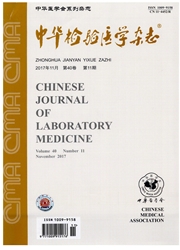

 中文摘要:
中文摘要:
目的评价染色体微阵列分析技术(CMA)在儿童神经发育性疾病(NDD),如不明原因的发育迟缓/智力障碍(DD/ID)、孤独症谱系障碍(ASD)、注意缺陷/多动障碍(ADHD)等疾病的临床分子诊断中的应用效能,探索儿童NDD神经发育疾病相关拷贝数变异(CNV)谱系及基因型一表型的关系。方法横断面研究。收集2014年4月至2015年4月就诊于上海交通大学医学院附属上海儿童医学中心(SCMC)发育行为儿科、主要诊断为ID/DD、ASD、ADHD的患儿107例,应用AffymetrixCytoScanDx芯片系统进行全基因组芯片检测,计算CMA在中国儿童NDD临床分子诊断中的诊断率。结果最终纳入病例共计107例。在106例芯片结果中共鉴定出27例(25.5%)携带非多态性CNV的病例,其中包括21例携带致病性CNV的病例及6例携带VOUS致病性不确定的病例。CMA对DD/ID及ASD的分子诊断率分别为26.3%(15/57)及10.2%(4/39)。在确定的非多态性CNV中,共有13个重现性CNV,分别分布于5个不同的染色体区域,分别为lq21.1-q21.2、15q11.2-q13.1、22q11.2、7q11.23及17q11.2。CMA对NDD患儿的总体临床分子诊断率为20.6%(22/107)。结论CNV是儿童神经发育性疾病的重要分子发病机制。
 英文摘要:
英文摘要:
Objective To assess the diagnostic yields of clinical chromosomal microarray (CMA) testing for patients with neurodevelopmetal disorders (NDD), and to characterize the spectrum of pathogenic copy number variation (CNV) in NDD. Methods The study was a cross-sectional study. NDD patients from Shanghai Children's Medical Center (SCMC) from April 2014 to April 2015 were recruited. DNA samples from SCMC cohort were tested on Affymetrix Cytoscan Dx microarray platform. The diagnostic yields of CMA testing were further assessed for the whole NDD cohort and each subgroup. Results A genome-wide genotype-phenotype analysis on a total of 107 NDD cases with CMA testing was conducted. Based on the SCMC clinical cohort, the overall diagnostic yield of CMA testing for NDD patients was 20. 6% (22/107). Excluding one case with chromosomal aneuploid, the frequency of non-polymorphic CNVs of the rest NDD cases were 25.5 % (27/106). The diagnostic yield for developmental delay/ intellectual disorder(DD/ID) and autism spectrum disorder(ASD)were 26. 3% (15/57) and 10. 2% (4/39) respectively. DD/ID was more likely to be associated with CNV than ASD and attention-deficit/hyperactivity disorder(ADHD). Five recurrent genomic loci were significantly enriched in patients including lq21.1-q1.2, 15qll. 2-q13.1, 22ql 1.2, 7ql 1.23 and 17ql 1.2. Conclusion CNV is an important pathogenesis in NDD. ( Chin J Lab Med, 2016, 39:246-250)
 同期刊论文项目
同期刊论文项目
 同项目期刊论文
同项目期刊论文
 2-Guanidine-4-methylquinazoline acts as a novel competitive antagonist of A type g-aminobutyric acid
2-Guanidine-4-methylquinazoline acts as a novel competitive antagonist of A type g-aminobutyric acid PI3-kinase/Akt pathway-regulated membrane insertion of acid-sensing ion channel 1a underlies BDNF-in
PI3-kinase/Akt pathway-regulated membrane insertion of acid-sensing ion channel 1a underlies BDNF-in A behavioral defect of temporal association memory in mice that partly lack dopamine reuptake transp
A behavioral defect of temporal association memory in mice that partly lack dopamine reuptake transp 期刊信息
期刊信息
